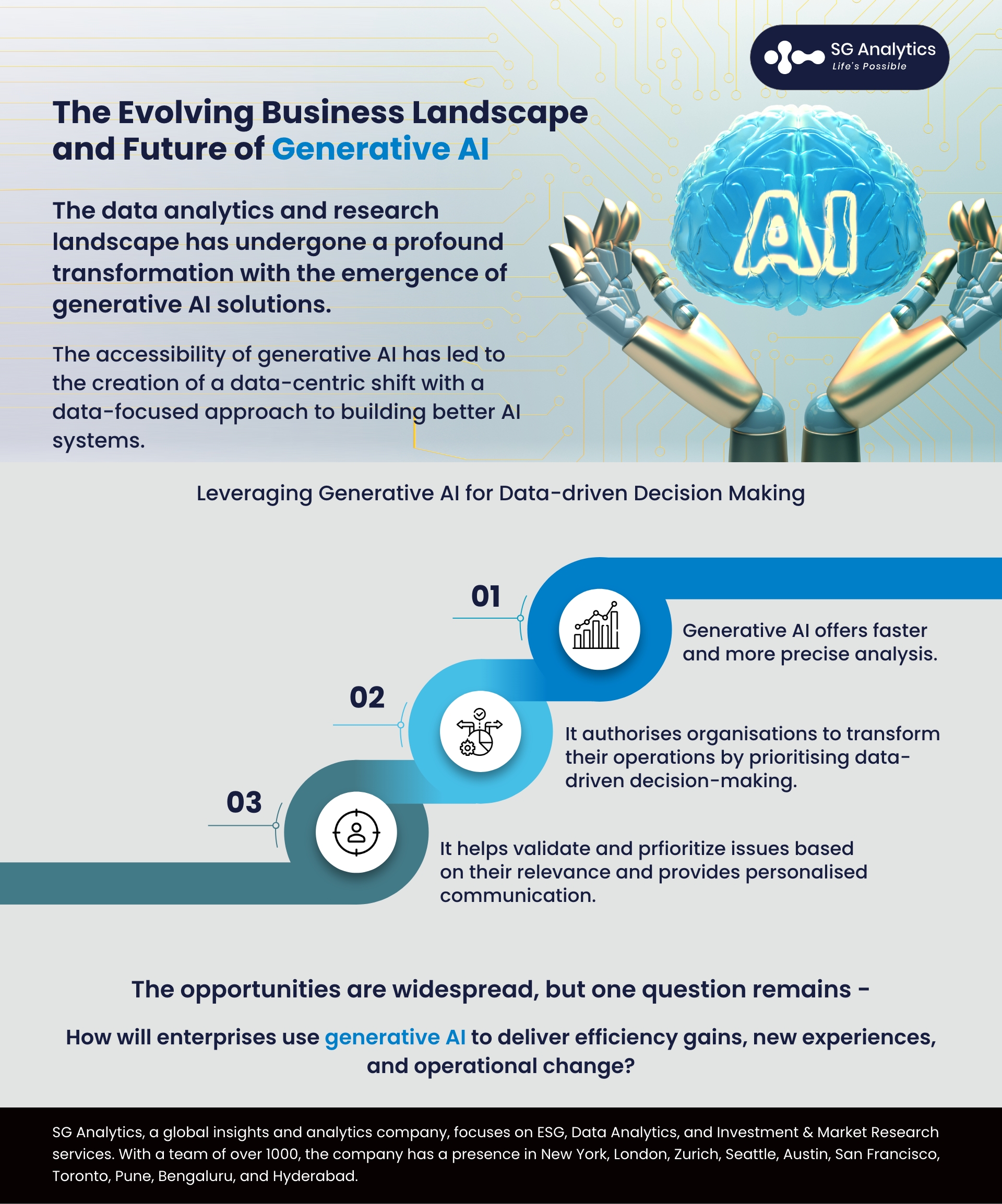The latest emergence of generative AI applications is enabling businesses to perform routine tasks, including reorganization and classification of data. Its ability to write text, compose music, and even create digital art has garnered headlines, thereby persuading consumers to experiment on their own. Generative AI is poised to unleash the next big wave of productivity for organizations across industries.
Today, a broader set of stakeholders is grappling with generative AI and its impact on their businesses as well as society. The far-reaching impacts of generative AI and its potential value are accelerating experimental and enterprise use cases.
The opportunities are widespread, but one question still remains - how will enterprises use generative AI to deliver efficiency gains, new experiences, and operational change, thereby enabling businesses to build sustainable models?
Read more: Transforming the World of Finance with Generative AI
Generative AI: The Latest Trend in Analytics
The data analytics and research landscape has undergone a profound transformation with the emergence of generative AI solutions. It is constantly changing consumer preferences as well as economic trends, thereby rendering previous research obsolete. Real-time and agile insights have become essential in the dynamic environment, prompting analysts and researchers to adapt and stay ahead of these shifting trends.
The use of generative AI is further enabling enterprises to stay abreast with the changing consumer economy and global market conditions. There is a growing need to be agile, as the industry is witnessing new instances that are driving it further into digitizing quantitative and qualitative data research.

The accessibility of generative AI has led to the creation of a data-centric shift from a model and code-centric approach to a more data-focused approach for building better AI systems. AI-specific data management solutions, synthetic data, and data labeling technologies are assisting organizations in solving many data challenges like accessibility, privacy, security, and scope.
And with synthetic data rapidly growing, businesses are relieving the burden of obtaining real-world data to train their machine-learning models effectively. Advanced machine learning that powers gen AI-enabled innovations is further assisting enterprises with fostering new customer relationships and support for financial services. A Gartner study predicted that by the year 2024, 60% of data for AI will be synthetic for simulating reality and future scenarios.
While generative AI can still be considered in its infancy and without risk, there are certain critical risks businesses need to address related to privacy, data security, managing bias, and transparency. They need to establish a clear balance of regulation and ethics, as well as expand the group of stakeholders and contributors beyond technologists and enthusiasts.
Read more: Impact of Artificial Intelligence (AI) on Marketing for Retail Banking
Leveraging Generative AI for Data-driven Decision Making
Every process starts with data. While good quality data can quickly make any AI effort smarter and more valuable, incomplete data can often result in risky suggestions and biased actions.
The biggest challenge of generative AI models today is incomplete data. To minimize and prevent these risks in workflows, it is crucial for data leaders to know where the data is coming from and how trustworthy it is.

Organizations are incorporating different AI-powered tools and systems to harness these benefits. With a focus on integrating generative AI with existing technologies, organizations can achieve targeted outcomes. It presents a transformative opportunity to not only maximize business value but minimize negative impacts. By managing a strong data strategy and programming AI tools with clear guidelines and governance, organizations can interact with the generative AI outputs while generating accurate insights that are produced from trusted data.
Generative AI offers faster and more precise analysis. This authorizes organizations to transform their operations by prioritizing data-driven decision-making, thereby fostering an effective and efficient work environment. Generative AI helps in validating and prioritizing issues based on their relevance and provides personalized communication to appropriate stakeholders, further empowering business leaders in making informed decisions. It also facilitates a feasible way of notifying business leaders with contextual information and possible resolutions.
Generative AI empowers organizations to make informed decisions and sustain smooth operations by aligning their operations with priorities and leveraging contextualized information for targeted workarounds.
Read more: Fostering Diversity in Tech: The New Catalyst for Innovation and Growth
Generative AI and its Impact on Organization
There are no limits on how generative AI can enable businesses to augment their workloads and improve performance and team experiences. With generative AI and large language model (LLM) tools, businesses can stream external data into analytics and predict potential outcomes. These tools also provide a trust score to indicate the reliability of the generated insights for more confident decision-making. Through a generative AI interface, organizations can design personalized services for consumers, thus establishing transparent long-term relations.

The new applications of generative AI have just started to show their potential. When leveraged securely, generative AI can augment the abilities of every organization and enhance their existing AI efforts.
Generative AI is destined to become a critical part of the business landscape. But the big question is how enterprises will leverage the tool to create a competitive advantage. When deployed strategically, it will touch every part of the organization, enabling employees to automate lower-level tasks and freeing their time to focus on solving bigger problems with data.
By getting a data strategy in order, an organization can confidently feed traditional and generative AI tools with high-quality data to drive better performance. Industry leaders also need to navigate their teams and incorporate risk-avoidance instincts to showcase how these solutions enhance every role within the organization.
Key Takeaway
-
The first half of 2023 witnessed a powerful connection between the top generative AI-related innovations.
-
Companies are shifting their focus toward generative AI applications and services to gain an understanding of the technology as they mature.
-
Industry leaders are setting the pace for foundational AI skills to harness the technology and dig deeper into comprehension of the skills to implement generative AI for solving business problems and biases.
Read more: Predictive Analytics Tools and Software for 2023: An Ultimate Guide

Final Thought
Artificial intelligence is an integral part of the enterprise analytics landscape and has been for many years. And now, generative AI is taking over the conversation across every industry.
The use of generative AI has been steadily increasing over the last few years. Generative AI enables enterprises to automate time-consuming tasks, such as data synthesis and qualitative data research, to generate meaningful insights. The ease of use and powerful insights help in delivering critical data solutions.
However, leaders need to be aware of the potential outcome of generative AI, as this time, more is at stake.
What enterprises do not fully understand is that generative AI applications learn quickly, and they are open public platforms that do not protect your data. Whatever is fed to the system is saved and used to train the algorithm, which is then delivered in a new form to the next user. It is not a far leap to imagine the systems accidentally providing proprietary data to one of these platforms.
So, organizations need to understand and be aware of how these solutions relate to their current data governance and security policies. With the right guidelines in place, the opportunities this technology provides certainly outweigh the risks. But it is vital to conduct a full review and design the data strategy accordingly.
SG Analytics, recognized by the Financial Times as one of APAC's fastest-growing firms, is a prominent insights and analytics company specializing in data-centric research and contextual analytics. Operating globally across the US, UK, Poland, Switzerland, and India, we expertly guide data from inception to transform it into invaluable insights using our knowledge-driven ecosystem, results-focused solutions, and advanced technology platform. Our distinguished clientele, including Fortune 500 giants, attests to our mastery of harnessing data with purpose, merging content and context to overcome business challenges. With our Brand Promise of "Life's Possible," we consistently deliver enduring value, ensuring the utmost client delight.
A leading enterprise in Data Analytics, SG Analytics focuses on leveraging data management, analytics, and data science to help businesses across industries discover new insights and craft tailored growth strategies. Contact us today to make critical data-driven decisions, prompting accelerated business expansion and breakthrough performance.









